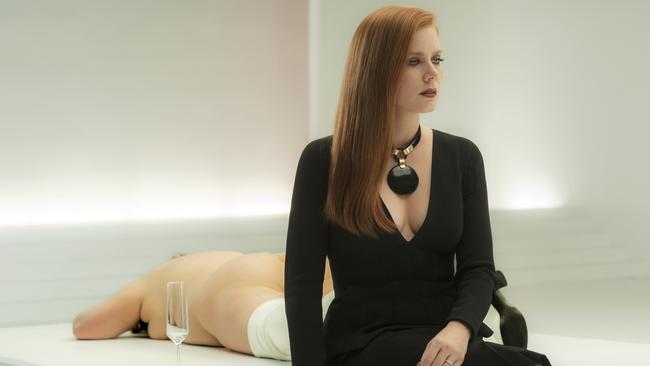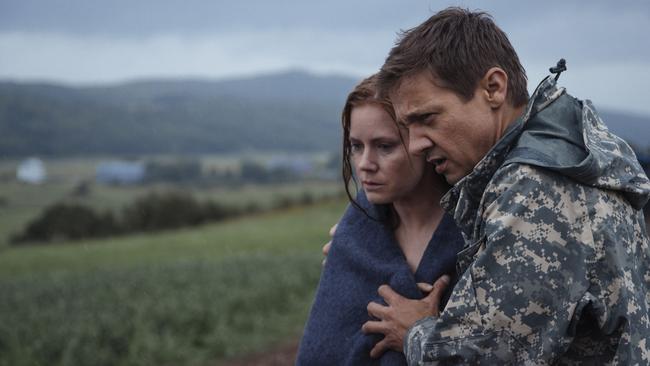Film reviews: Amy Adams shines in Nocturnal Animals and Arrival
Tom Ford’s Nocturnal Animals is head and shoulders above the typical tired films made in Hollywood these days.

It has been a long wait since A Single Man (2009) for the second feature from fashion designer turned director Tom Ford, but Nocturnal Animals, which won the Silver Lion in Venice this year, is well worth it. This haunting amalgamation of film noir and pulp fiction is an intricately structured and completely riveting affair that unfolds on two levels and in two styles: as a domestic melodrama and as a revenge thriller.
The film opens with an extraordinary sequence in which a group of overweight women, almost nude except for some marching band fripperies, gazes at the camera while Abel Korzeniowski’s stirring music pounds the soundtrack; these women, it transpires, are the latest installation in a trendy Los Angeles art gallery owned by Susan Morrow (Amy Adams), one of those women who has everything and nothing. She lives in an ugly steel-and-glass house overlooking the city and is painfully aware that her financier husband Walker (Armie Hammer) is not only unfaithful but in financial difficulties. It’s at this tipping point in Susan’s life that she receives, out of the blue, the manuscript of a novel, Nocturnal Animals, written by her first husband, Edward (Jake Gyllenhaal), whom she hasn’t seen for 19 years.
As she starts to read, the book’s narrative becomes part of the film. Tony (also Gyllenhaal) is driving at night through west Texas with his wife Laura (Isla Fisher) and their spoiled teenage daughter India (Ellie Bamber) when they’re forced off the road by a carload of hoons led by Ray (Aaron Taylor-Johnson). In the aftermath of this chilling encounter, Tony finds himself allied with an unconventional Texan detective, Bobby Andes, brilliantly played by Michael Shannon.
As Susan delves deeper into the traumatic events depicted in Edward’s book she also remembers the time they spent together two decades earlier — both Adams and Gyllenhaal manage to look convincingly younger in these scenes — and why their relationship broke down; Susan’s appalling mother (a delirious cameo from Laura Linney) seems to have been a major factor in the separation.
Since his first feature, Ford has refined his technique to the extent that his new film, which is based on a novel, Tony and Susan, by Austin Wright, is a bewitching blend of classical and modernist cinema. At times nail-bitingly suspenseful, at other times deliciously bitchy (there are cherishable cameos from Michael Sheen, Andrea Riseborough and Jena Malone among others), the film is head and shoulders above the typical tired Hollywood production that comes down the assembly line these days.

Much the same could be said for Arrival, another unusually intelligent and smart production — it’s obvious we’re nearing the Oscar season again when films such as these are being released just in time to score nominations, which they well may. This is a film about aliens who arrive on Earth and before you can say Independence Day it’s obvious that Canadian director Denis Villeneuve and screenwriter Eric Heisserer have something more thoughtful in mind than a mere popcorn movie.
Like its cinematic forebears The Day the Earth Stood Still (the 1951 version) and Steven Spielberg’s Close Encounters of the Third Kind, Arrival is a film that invites audiences to think about what might happen if visitors from outer space did, indeed, reach Earth. How would we communicate and could the Earth’s nations co-operate in their approach to the visitors?
The film begins by introducing Dr Louise Banks, a role in which the gifted Amy Adams gives yet another memorable performance. Recovering from a tragedy (her beloved daughter was stricken with cancer), Banks teaches linguistics at an eastern university, but her class is interrupted with the news that a dozen strange objects, presumably spacecraft, have arrived and are hovering just above the surface on locations across the globe, including Australia, Russia and China. These egg-shaped vehicles — which look a little like the Skylon created for the 1951 Festival of Britain — are simply floating in the air, waiting for something, but for what?
Banks agrees to accompany a military officer, Weber (Forest Whitaker), and Dr Ian Connelly (Jeremy Renner), a theoretical physicist, to the location of the American landing, which is located in rural Montana. Her role is to try to communicate with whoever is on board the craft and to pose the essential questions: Why have you come? Are your intentions peaceful? Scenes of contact in this sort of sci-fi film are always fascinating, and Arrival contains some of the best. Banks’s encounter with the aliens and her efforts to understand them are quietly riveting and testimony to the serious intentions of Villeneuve (who is in production of the long-awaited sequel to Blade Runner.)
The film also explores the fraught relationship between scientists, governments and the media, and throws international tensions into the mix. While ignorant shock jocks call for action against the invaders, governments around the world attempt, at least for a while, to present a united front in what is, to put it mildly, a challenging situation.
Visually the film is as impressive as you may wish, and the sense of unease is augmented by the offbeat music score by Johann Johannsson. In this film and Nocturnal Animals, Adams lays claim to be one of the finest movie actors of her generation. She’s fortunate to have been cast in two such distinguished films that, coincidentally, have been released into cinemas almost simultaneously. She is not, however, the only memorable element in Arrival, a film that takes a genre that invariably has been the basis for schlock (Independence Day and others) and infuses it with a level of seriousness that’s thought-provoking and satisfying.
Two R-rated foreign language films that have recently played the film festival circuit and are having limited cinema releases are worth seeing if they show up at a cinema near you. The Handmaiden (Agassi) is an erotic melodrama from South Korean director Park Chan-wook, known for his revenge dramas such as Oldboy. Set in the 1930s, when Korea was occupied by Japan, this intricately structured lesbian drama involves a plot to fleece a rich woman of her fortune, and the role played in the scam by an orphan who becomes the woman’s handmaiden and sexual partner. The film is elegantly made, intriguing and unsettling. Neon Bull (Boi neon) comes from Brazil and follows the lives of an itinerant rodeo worker, his girlfriend and their young daughter. Director Gabriel Mascaro’s film is light on narrative but strikingly shot and edited, and ultimately strangely compelling.
Nocturnal Animals (MA15+)
4 stars
National release
Arrival (M)
4 stars
National release




To join the conversation, please log in. Don't have an account? Register
Join the conversation, you are commenting as Logout